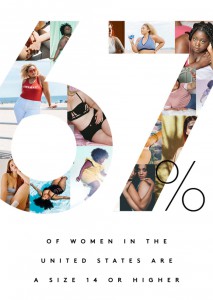More Than Just a Thousand Words: Standing Up for Underrepresented Bodies in Media
From a young age, women are taught by media messages about Western beauty norms that their appearance just isn’t good enough. For most of us, the first time we manipulate our bodies by shaving our legs and wearing makeup are milestones in our transition to womanhood. Women are constantly confronted with distorted images that we feel we need to replicate to be adequate. Leaving the house also often means being bombarded by comments on our appearances. As a result, some of us have learned to be hyper-aware of how our bodies appear.
According to a study published in the International Journal of Fashion, Design, Technology and Education, even though the majority of women in the United States wear a size fourteen and up, they constitute only 2 percent of the bodies seen in marketing, journalism, and on television. Instead of representing what is, the media shows what we are expected to be. For example, today, only 1.4 percent of lead characters in film and television go to Asian Americans. And when women of color are in the media, they are oftentimes entirely misrepresented.
Last week the women-oriented digital media company Refinery29 kickstarted a joint campaign with Lane Bryant, Danielle Brooks, and Getty Images. The initiative, called The 67% Project, seeks to promote body positivity and diverse representation in American media by offering editorial content that showcases the 67 percent of women underrepresented in mainstream media.
To create an infrastructure that is severely lacking, Refinery29, Getty Images, and actress Danielle Brooks are giving everyone access to license The 67% Collection, an assortment of stock photos that reflects the 67 percent of women in America who wear a size 14 or over. The images show women of all backgrounds doing ordinary, daily tasks like walking down the street, taking public transit, working on the computer, buying food and other items, putting on makeup, and talking with people.
“Our goal is to ensure that when you slide open your phone in the morning and click on a link into our world, that you see yourself reflected back. And not just the physical ‘ideal’ that’s been a systemic part of the female experience since the beginning of time, but true, authentic, and accessible likenesses of your own experiences,” said Christene Barberich, global editor-in-chief and cofounder of Refinery29 in a Huffington Post column.
Unfortunately, the project is only set to last for one week, although Refinery29 does hope to come back to the campaign on a quarterly basis. It is a first step, as they acknowledge, that will hopefully lead to more awareness around the need to advocate for body positivity and highlight the realistic representation of women in the United States.
Danielle Brooks, well-known for her role as Tasha “Taystee” Jefferson on popular Netflix original series Orange Is the New Black, is the guest creative director of the project. “It’s always been heartbreaking growing up…to not see myself. And now I am that girl I wanted to see, and I can’t wait to see what it does for the next generation of women that are coming up,” she told SELF magazine.
Othering—classifying someone as different and “not one of us,”— makes women and other denigrated groups feel as though something is inherently wrong with them. In fact, “othering”, writes anthropologist Margo DeMello, “is a precondition for oppression and subjection that aids in denying members of certain groups considerability and agency because of their differential markers.” Despite being the majority, retailers still perceive women that wear above a 14 as being “plus” sized. Stores like H&M sell clothes in these sizes, but only online, where they’re separate and hidden from the retailer’s public and storefront image.
Women who weigh more than the normative “ideal” face unseen discrimination in society. For instance, they experience significant burdens when it comes to advancing in the workforce. A study found that 45 percent to 61 percent of top male CEOs are overweight, while only 5 to 22 percent of top female CEOs are. Additionally, medical students may have an unconscious bias against overweight patients, leading to inaccurate health care. And in a courtroom, plus-sized women are more likely to be perceived as guilty than their male counterparts.
Refinery29 is not the first to launch a body positivity campaign. Women have been using social media to tirelessly win the respect and visibility they so deserve. But we need to be clear—women and other disadvantaged groups should not have to spend their time defending their right to exist. We all deserve representation, and in essence, we all are responsible for deconstructing our biases.
As humanists, we certainly value health and wellbeing, but we must acknowledge that healthy doesn’t always mean thin, and fat-shaming doesn’t lead to wellbeing. Besides, we have no right to govern others based on our beliefs so long as they aren’t hurting anyone else. Policing women’s appearances and weights aren’t actually an expression of genuine concern for health. Rather, they are yet another control tactic to hold back women’s full equality in society.

